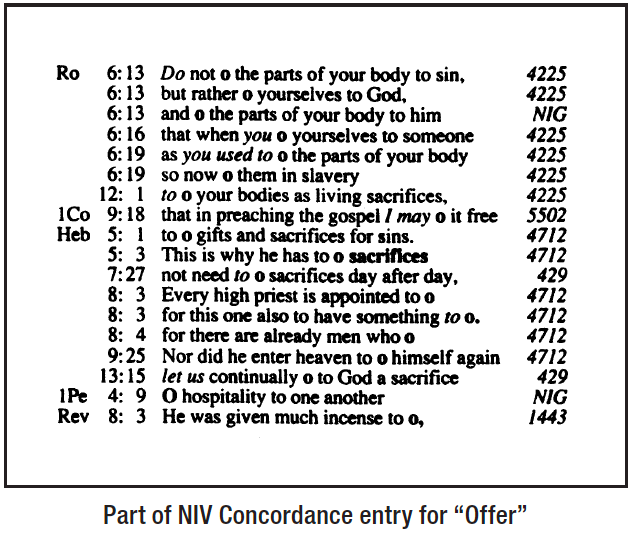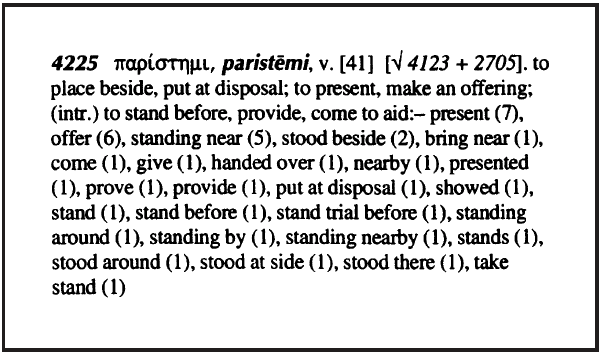UNIT 6:12 STUDY
A Word Study: “Offer” in Romans 12:1
The purpose of this section is to give you a complete example of what we have just talked about doing.
-
- Choose your words carefully.
As we read through Romans 12:1–2, we select the word “offer” for further study because it is crucial to our understanding of the passage. In view of God’s mercy, what are we supposed to do? We are to “offer” our bodies to God. Knowing more about the meaning of this key verb will help us see how we are to respond to God in light of all he has done for us.
-
- Determine what the word could mean.
Let’s use our concordance to find the range of meaning for the word. Look up the word “offer” in the Strongest NIV Exhaustive Concordance and locate its G/K number.
Since the English word “offer” is a translation of a Greek word, find the number 4225 in the “Greek to English Dictionary and Index” in the back of the concordance. This entry shows the variety of ways that the original Greek word παρίστημι(transliterated paristēmi) is used in the New Testament.


A list of word definitions and the different ways in which the NIV translates the Greek work paristēmi (G/K 4225)
By looking at the context of each occurrence of paristēmi, we can put together the word’s range of meaning:
a. to make available, to put at someone’s disposal, to provide (e.g., Matt. 26:53: “Do you think I cannot call on my Father, and he will at once put at my disposal more than twelve legions of angels?”)b. to arrive, to come (e.g., Mark 4:29: “As soon as the grain is ripe, he puts the sickle to it, because the harvest has come.”)c. to stand by, to be present (e.g., Mark 14:47: “Then one of those standing near drew his sword and struck the servant of the high priest, cutting off his ear.”)d. to present someone to someone (e.g., Luke 2:22: “When the time came for the purification rites required by the Law of Moses, Joseph and Mary took him to Jerusalem to present him to the Lord.”); note too that occasionally the someone is presented as something (e.g., Col. 1:22: “But now he has reconciled you by Christ’s physical body through death to present you holy in his sight, without blemish and free from accusation.”)e. to stand against, to appear as an enemy (e.g., Acts 4:26: “The kings of the earth rise up and the rulers band together against the Lord and against his anointed one.”)f. to prove or demonstrate (e.g., Acts 24:13: “And they cannot prove to you the charges they are now making against me.”)g. to appear before a judge (e.g., Acts 27:24: “[He] said, ‘Do not be afraid, Paul. You must stand trial before Caesar.’”)h. to help (e.g., Rom. 16:2: “I ask you to receive her in the Lord in a way worthy of his people and to give her any help she may need from you, for she has been the benefactor of many people, including me.”)i. to bring close or near (e.g., 1 Cor. 8:8: “But food does not bring us near to God; we are no worse if we do not eat, and no better if we do.”)
-
- Decide what the word does mean in context.
We must look carefully at the use of paristēmi in Romans 12:1. Beginning in 12:1 Paul shifts his focus to how Christians should respond to their experience of God’s mercy in Christ (detailed in chs. 1–11). The word “therefore” signals this transition from the theological foundation in chapters 1–11 to the exhortation in chapters 12–15. We are urged to respond to God by presenting or offering our bodies as a sacrifice.
Of the possible meanings for paristēmi listed above, the context suggests either sense (a) “to make available, to put at someone’s disposal, to provide” or sense (d) “to present someone to someone” as the best options. These are closely related meanings, and it is difficult to determine which one is best. We turn again to the context.
This word is used elsewhere in Romans in 6:13, 16, 19; 14:10; and 16:2. The parallels between the use of the word in chapter 12 and the uses in chapter 6 are strong. In both cases people are giving their bodies in service to some power. Since “body” probably refers here to the whole person and not just to the physical body, sense (d) seems preferable: We are giving ourselves to God.
We should also pay particular attention to the imagery of sacrifice in chapter 12, imagery not present in chapter 6. In 12:1 we are exhorted to offer our bodies as a sacrifice. Since Christ has fulfilled the Old Testament sacrificial system, Christians no longer offer literal sacrifices as part of our worship. Instead, we offer ourselves totally and continuously to God as a sacrifice—a living, holy, and pleasing sacrifice.
God gave himself to us through the once-for-all sacrifice of his Son, Jesus Christ. We worship God by giving all of ourselves (bodies included) to him. Two kinds of sacrifice are involved: he died for us, and we are to live for him!
As a matter of checking our work, examine what a leading word-study resource says about the word “offer” (paristēmi). The entry shown here is from The New International Dictionary of New Testament Theology: Abridged Edition, edited by Verlyn D. Verbrugge (Grand Rapids: Zondervan, 2000), 439.